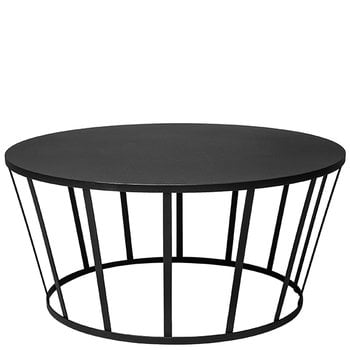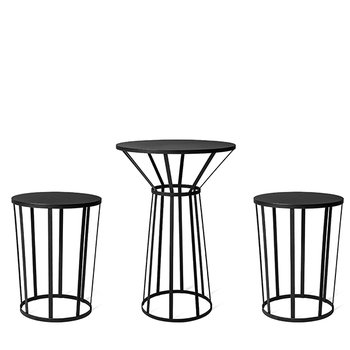Petite Friture’s Hollo is a collection of elegant tables that play with hollow space and solid surfaces. Designers Amandine Chhor and Aïssa Logerot have created three clean-lined steel tables that feature a round top and a base that is both airy and sturdy. The minimalist and geometric design of the Hollo range is suitable for various spaces and settings. Available in vibrant and calm colours.
Hollo coffee table, black
Petite Friture
Description
Petite Friture’s Hollo is a collection of elegant tables that play with hollow space and solid surfaces. Designers Amandine Chhor and Aïssa Logerot have created three clean-lined steel tables that feature a round top and a base that is both airy and sturdy. The minimalist and geometric design of the Hollo range is suitable for various spaces and settings. Available in vibrant and calm colours.
Product details (4)
- Colour
- Black
- Height
- 33 cm
- Diameter
- 70 cm
- Material
- Coated steel, grained epoxy paint
- Product ID
Designer
Amandine Chhor (b. 1983) and Aïssa Logerot (b. 1981) are renowned French designers with a focus on product and furniture design. Both studied industrial design at Ensaama and ENSCI-Les Ateliers in Paris and worked for various companies and studios before founding their AC/AL design studio in 2013 – Chhor for example at Hermès and Logerot at Mathieu Lehanneur’s studio. Aïssa Logerot has also studied cabinet making at École Boulle. Their merits include the Red Dot Award for the Extensios design concept in 2009 and Grand Prix de la Création de la ville de Paris in 2010.
View all productsReviews (0)
Sustainability
The Product Sustainability Framework, our criteria of sustainable design, helps you find the most sustainable products in our selection. Read below which sustainability criteria this product has met.
Working conditions & labour 7/9
-
Equal opportunities for all employees
-
Commitment to UN Global Compact, fair compensation for all employees
-
Corporate responsibility requirements defined and communicated for suppliers
-
Systematic work for improved inclusion and well-being in the workplace
-
Transparent supply chain
-
Suppliers' compliance to a code of conduct ensured
-
Support for community involvement in the supply chain
-
Direct suppliers audited and certified
-
Compliance to the UN Guiding Principles on Business and Human Rights ensured in the supply chain
Eco-friendly production 6/9
-
Fair and resource-wise water-use in production
-
No incineration or landfilling of returned items
-
No use of endangered species as materials
-
No direct environmental emissions or waste (excl. GHGs) from production
-
Material-efficient and ecological packaging
-
No potentially harmful chemicals used in own production
-
The sustainability of direct suppliers' production is addressed and monitored
-
Production and material sourcing that respect biodiversity, animal rights, and natural ecosystems
-
Positive impact on nature’s well-being through operations that regenerate natural ecosystems
Climate impact 3/8
-
Company's direct greenhouse gas emissions identified and commitment to reduction
-
Product's carbon impact identified and commitment to reduction
-
Guidance on energy- and eco-efficient use of the product
-
Contribution to climate initiatives beyond the brand’s direct operations
-
Low-carbon or compensated transportation
-
Carbon footprint of the product calculated and goals set to reduce it
-
100 % renewable energy in own production and operations
-
Carbon neutral or carbon negative product
Sustainable materials 5/6
-
Sustainable and long-lasting material choices
-
No harmful or hazardous substances
-
Responsible raw material sourcing and production
-
Materials suited for circularity: monomaterials, recyclable finishings, renewable or recycled contents etc.
-
Ecological materials: natural, biodegradable, recyclable or recycled contents
-
Outstanding materials in terms of innovativeness, responsibility, sustainability and circularity: local production or sourcing, 100 % recycled content, C2C-certification etc.
Circular design 4/5
-
High aesthetic quality promoting long-term use of the product
-
Technically durable product design and material choices
-
Design for enduring life-long quality
-
Design and support for product maintenance, repair and upgradability
-
Innovative circular design solutions: circular service system, resale platform, remanufacturing, collection of used products, etc.







